Crescent Sustainability Initiatives
Affordable and Clean Energy (SDG 7)
B.S. Abdur Rahman Crescent Institute of Science and Technology (BSACIST) actively promotes low-carbon initiatives through its dedicated wing, the Crescent Innovation and Incubation Council (CIIC). Recognizing the urgent need for sustainable practices, CIIC provides robust support to start-ups focused on developing technologies and solutions that contribute to a low-carbon economy. By offering resources, mentorship, and funding opportunities, CIIC empowers innovative entrepreneurs to create impactful products and services that reduce carbon emissions and foster environmental sustainability. This commitment not only enhances the entrepreneurial ecosystem but also plays a crucial role in advancing the Institute’s mission towards a greener future.
Several innovative start-ups are making significant strides in sustainability and environmental responsibility in the pursuit of a low-carbon economy. Companies like Aloe Ecell, RAPTEEHV, Carbyne Energy Tech, and E-Daddy exemplify technology’s transformative potential in fostering a greener future. These organisations develop ground breaking products and contribute to a broader ecosystem that supports low-carbon innovation.
A. Aloe Ecell: Pioneering Eco-Friendly Batteries
Aloe Ecell stands out with its pioneering development of the world’s first 100% eco-friendly battery made from aloe vera. This innovative approach emphasises sustainability and aims to revolutionize battery technology, marking a significant advancement in energy solutions. The company has garnered global recognition for its contributions, including Schneider Electric accolades, highlighting its commitment to environmental stewardship. Furthermore, Aloe Ecell actively engages the next generation of innovators by offering internship programs for students at various academic levels, encouraging research in fields such as electrophysics and electrochemistry.
For more information, you can visit their official website: Aloe Ecell
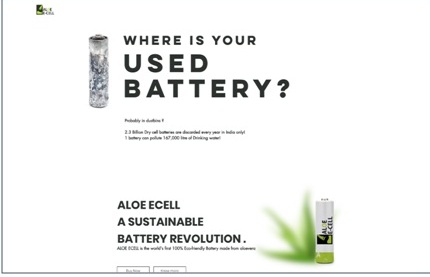
Figure VII (4.5) – 1 : Front page of the website of M/s. Aloe Ecell Company
The Memorandum of Understanding (MoU) between Crescent Innovation and Incubation Council (CIIC) and Aloe Ecell Private Limited emphasizes collaboration to support start-ups focused on low-carbon innovations. This partnership aims to provide essential assistance and resources to foster the development of technologies that contribute to a sustainable, low-carbon economy, thereby promoting environmental sustainability and innovation in the region.
The MOU copy is enclosed herewith: Aloecell MOU with CIIC- BSACIST
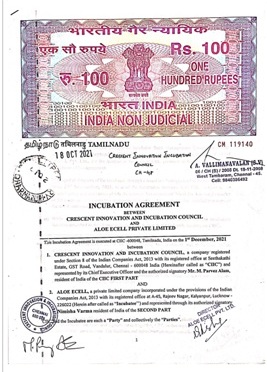
Figure VII (4.5) – 2 : Front page of the MOU Copy
B. RAPTEEHV: High-Voltage Solutions for Sustainability
RAPTEEHV specializes in high-voltage electrical solutions, providing essential services and products for industrial applications. Their focus on delivering high-voltage electrical systems, such as substations and transformers, is crucial for modern energy demands. By offering engineering consulting services and project management for electrical infrastructure development, RAPTEEHV ensures that its solutions are efficient and sustainable. The company’s commitment to minimizing environmental impact while meeting energy needs aligns perfectly with the goals of a low-carbon economy.
For more detailed information, you can visit their official website: RAPTEEHV.
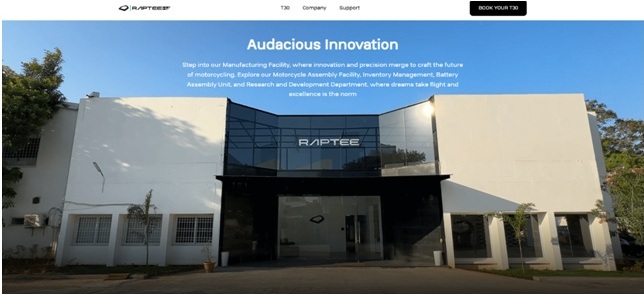
Figure VII (4.5) – 3 : Front page of the website of M/s. RAPTEEHV Company
The Memorandum of Understanding (MoU) is an Incubation Agreement between Crescent Innovation and Incubation Council (CIIC) and Raptee Energy Private Limited, aimed at fostering innovation and entrepreneurship. Signed on February 11, 2022, in Chennai, the agreement outlines the collaboration between the two parties, emphasizing their commitment to support the development of innovative projects and resolve any disputes through Indian arbitration.
The MOU copy is enclosed herewith: RAPTEEHV MOU with CIIC- BSACIST
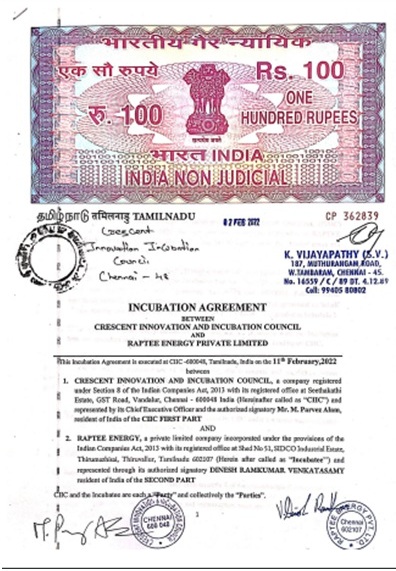
Figure VII (4.5) – 4 : Front page of the MOU Copy
C. Carbyne Energy Tech: Advancing Sustainable Energy Solutions
Carbyne Energy Tech is another key player in the low-carbon innovation landscape, harnessing cutting-edge technologies to develop sustainable energy sources. Their focus on energy storage technologies enhances the reliability and efficiency of energy distribution, which is vital for integrating renewable energy into the grid. Carbyne’s investment in research and development underscores its dedication to creating new solutions that optimise energy usage and facilitate the transition to greener alternatives. Carbyne ensures a broad impact on energy efficiency by catering to various sectors, including renewable energy and electric vehicles.
For more detailed information, you can visit their official website: Carbyne Energy Tech.
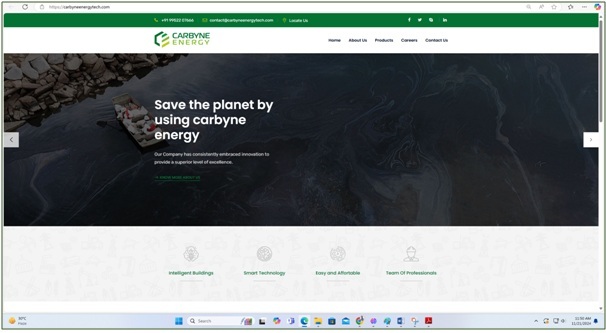
Figure VII (4.5) – 5 : Front page of the website of M/s. CARBYNE ENERGY
The Memorandum of Understanding (MoU) between Crescent Innovation and Incubation Council (CIIC) with M/s. Carbyne Energy underscores a commitment to assist start-ups that promote low-carbon innovation. CIIC is dedicated to providing essential resources, mentorship, and support to these start-ups, enabling them to develop technologies and solutions that contribute to a sustainable, low-carbon economy. This initiative aims to foster entrepreneurship while addressing critical environmental challenges.
The MOU copy is enclosed herewith: Carbyne Energy Technologies with CIIC- BSACIST
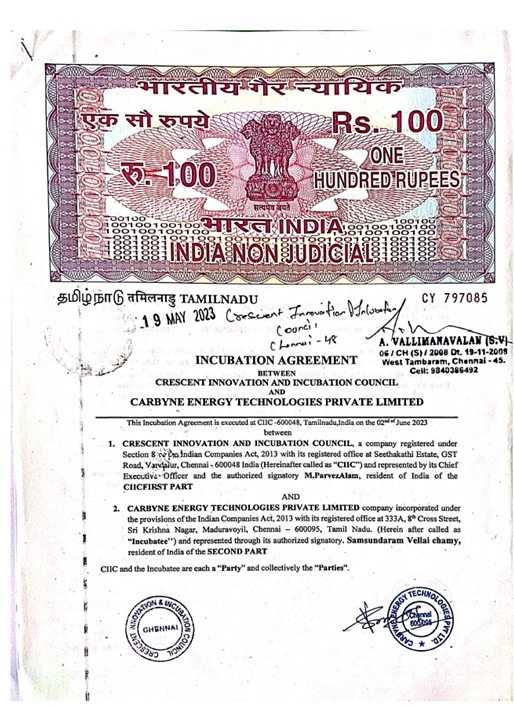
Figure VII (4.5) – 6 : Front page of the MOU Copy
D. E-Daddy: Revolutionizing Electric Vehicles
E-Daddy’s Electric Vehicle Intelligence System exemplifies the integration of advanced technology in the automotive sector. E-Daddy enhances vehicle performance while ensuring durability and intelligence using industry-grade powertrains and a modular power management strategy. This innovative approach improves driving experiences and supports the transition to electric vehicles, which are essential for reducing carbon emissions in transportation.
For more detailed information, you can visit their official website: Edaddy.
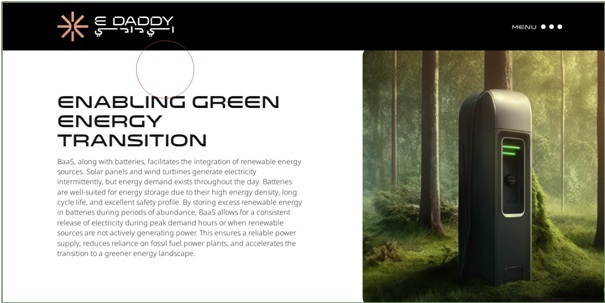
Figure VII (4.5) – 7 : Front page of the Website of M/s. E-Daddy
The Memorandum of Understanding (MoU) between Crescent Innovation and Incubation Council (CIIC) with M/s. E-Daddy underscores a commitment to assist start-ups that promote low-carbon innovation. CIIC is dedicated to providing essential resources, mentorship, and support to these start-ups, enabling them to develop technologies and solutions that contribute to a sustainable, low-carbon economy. This initiative aims to foster entrepreneurship while addressing critical environmental challenges.
The MOU copy is enclosed herewith: E-Daddy with CIIC- BSACIST

Figure VII (4.5) – 8 : Front page of the MOU Copy
POLICY FOR ENERGY-EFFICIENT RENOVATION AND BUILDING
Issue: 04; Revised on 2023
| Policy Created on | July 2009 |
| 1st Revision amended on | IQAC Meeting held on 27th October 2017 |
| 2nd Revision amended on | IQAC Meeting held on 31st March 2021 |
| 3rd Revision amended on | IQAC Meeting held on 16th June 2023 |
Responsible Executive : Director (IQAC)
Responsible Office : Internal Quality Assurance Cell, Estate Office, and SDG Cell
Contacts : Registrar, Director (IQAC)
The B.S. Abdur Rahman Crescent Institute of Science and Technology is committed to ensuring that all renovations and new constructions on campus adhere to stringent energy efficiency standards. This policy aims to:
- Ensure universal access to affordable, reliable, modern energy services.
- Increase substantially the share of renewable energy in the global energy mix.
- Double the global rate of improvement in energy efficiency
- Enhance international cooperation to facilitate access to clean energy research and technology.
- Expand infrastructure and upgrade technology to supply modern and sustainable energy services, particularly in developing countries.
7.2 REASON FOR THIS POLICY
This policy is established to promote energy-efficient practices in renovating existing infrastructures and constructing new buildings. By adhering to energy efficiency standards, the Institute aims to reduce greenhouse gas emissions, lower operational costs, and contribute to the global efforts to combat climate change, which aligns with SDG 7 – Affordable and Clean Energy.
7.3 RESPONSIBILITIES
7.3.1 Policy Principles
The Institute shall implement the following principles to ensure compliance with energy efficiency standards:
- All renovations and new constructions must achieve recognised building rating systems such as EDGE, IGBC, and LEED.
- Sustainable design features, including using renewable energy sources, shall be integrated into all projects.
- An efficient waste management plan shall be established to minimize waste and promote recycling.
- Rainwater harvesting systems shall be implemented in all new buildings.
- Energy conservation shall be prioritized through the installation of energy-efficient appliances and equipment.
- Regular audits of energy consumption shall be conducted to identify areas for improvement.
- Use of low VOC (Volatile Organic Compounds) materials in construction and renovation to minimize harmful emissions.
- Adoption of eco-friendly housekeeping practices using biodegradable chemicals.
- Implementation of high reflective roofing materials and green roofs to reduce heat island effects.
- Encourage water-efficient landscaping and high-efficiency irrigation technology in new construction projects.
- Support R&D activities towards energy-efficient renovation and building.
- Enhance national/international cooperation to facilitate access to green building technology.
- Dissemination of Policy
- Awareness programs shall be conducted regularly for all stakeholders regarding energy-efficient practices.
- This policy shall be publicly accessible on the Institute’s website and updated as necessary.
7.3.3 Enforcement of Policy
- The Director (Planning and Development) and their team are responsible for monitoring compliance with this policy.
- Compliance shall be communicated to architects, design engineers, and construction workers involved in projects.
7.2.1 – ENERGY EFFICIENCY POLICY.pdf
POLICY FOR DIVESTMENT FROM CARBON-INTENSIVE ENERGY INDUSTRIES
Issue: 04; Revised on 2023
| Policy Created on | July 2009 |
| 1st Revision amended on | IQAC Meeting held on 27th October 2017 |
| 2nd Revision amended on | IQAC Meeting held on 31st March 2021 |
| 3rd Revision amended on | IQAC Meeting held on 16th June 2023 |
Responsible Executive: Director (IQAC)
Responsible Office: Internal Quality Assurance Cell, Estate Office, and SDG Cell
Contacts: Registrar, Director (IQAC)
The B.S. Abdur Rahman Crescent Institute of Science and Technology is committed to divesting from carbon-intensive energy industries, particularly coal and oil, to promote sustainable energy practices and contribute to the global efforts to combat climate change. This policy aims to:
- Ensure universal access to affordable, reliable, and modern energy services.
- Increase substantially the share of renewable energy in the global energy mix.
- Double the global rate of improvement in energy efficiency.
- Enhance international cooperation to facilitate access to clean energy research and technology.
- Promote investment in energy infrastructure and clean energy technology.
7.2 REASON FOR THIS POLICY
This policy is established to minimize the Institute’s carbon footprint by reducing investments in fossil fuels and promoting renewable energy sources. By divesting from carbon-intensive industries, the Institute aligns with the United Nations’ Sustainable Development Goals, particularly SDG 7: Affordable and Clean Energy, and supports the transition to a sustainable energy future.
7.3 RESPONSIBILITIES
7.3.1 Policy Principles
The Institute shall implement the following principles to ensure effective divestment from carbon-intensive energy industries:
- Conduct a comprehensive review of current investments to identify carbon-intensive assets.
- Gradually divest from all investments in coal and oil industries within a specified timeframe.
- Reallocate funds towards renewable energy projects and sustainable technologies.
- Collaborate with financial institutions that prioritize sustainable investment practices.
- Promote transparency in investment decisions and publicly report on divestment progress.
- Engage with stakeholders, including students and faculty, to raise awareness about the importance of divestment from fossil fuels.
- Support research and development initiatives focused on clean energy technologies.
7.3.2 Dissemination of Policy
- This policy shall be publicly accessible on the Institute’s website to ensure transparency.
- Awareness programs shall be conducted regularly for all stakeholders regarding the importance of divestment from carbon-intensive industries.
- Updates on divestment progress shall be communicated through newsletters and reports.
7.3.3 Enforcement of Policy
- The Director (Finance) and their team are responsible for monitoring compliance with this policy and reporting on divestment progress.
- Any breach of this policy may result in a review of investment strategies and potential disciplinary actions as prescribed by the Institute’s code of conduct.


